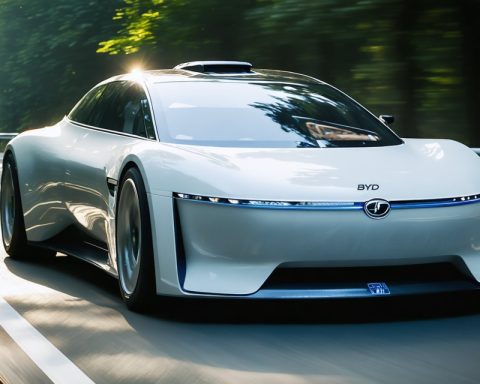Groundbreaking Research on Hybrid Hydrogen Engines
NASA is championing an innovative approach to aircraft propulsion by funding a groundbreaking study at the University of Illinois Urbana-Champaign. This research focuses on a hybrid propulsion system that uniquely merges gas turbines with fuel cells, both utilizing liquid hydrogen as a power source.
The initiative falls under NASA’s Innovative Advanced Concepts (NIAC) program, which aims to explore pioneering technologies that could redefine aviation. Researchers at the university are set to examine the viability of this hybrid design, known as the Hy2PASS engine. The system is designed to enhance efficiency and reduce environmental impact in the aviation sector.
This ambitious project capitalizes on the strengths of both fuel cells and gas turbines, employing electric compressors to optimize performance. If successful, this development could signify a monumental shift in how aircraft are powered, potentially leading to cleaner, more sustainable air travel.
As the world shifts toward greener technologies, this study could play a crucial role in addressing the pressing challenges of climate change and pollution in aviation. With funding from NASA, the University of Illinois aims to unlock new possibilities in aerospace engineering, positioning itself at the forefront of the hydrogen-powered revolution.
Innovations like these promise not only to enhance flight efficiency but also to set the stage for a new era of environmentally friendly flying.
The Broader Impact of Hybrid Hydrogen Engines in Aviation
The research into hybrid hydrogen engines, spearheaded by NASA and the University of Illinois Urbana-Champaign, holds transformative potential beyond the confines of aerospace. This technology could symbolize a pivotal shift in societal views on sustainability, reshaping our relationship with air travel. As global demand for air transport continues to surge, addressing its environmental footprint becomes imperative.
The implications extend deeply into cultural acceptance of green technologies. As consumers increasingly prioritize eco-friendly options, successful implementation of hydrogen-powered aircraft may catalyze a broader movement towards sustainability in various sectors. If the Hy2PASS engine can demonstrate a viable path to zero-emission flights, we could see a significant public shift in perceptions of the aviation industry—from a major source of pollution to a leader in innovation and climate awareness.
Economically, the proliferation of hydrogen-powered aircraft could disrupt global markets. Investment in such technologies fosters new industries around hydrogen production and distribution. Countries rich in renewable energy resources may emerge as leaders in this new economic landscape, potentially leading to a realignment of global energy dependencies.
Environmental effects are also critical. Hydrogen fuel, when produced sustainably, could dramatically reduce greenhouse gas emissions and noise pollution associated with air travel. As nations pursue cleaner energy solutions, the advancements made in hybrid propulsion could serve as a blueprint for reducing the aviation sector’s impact on climate change.
In conclusion, the hybrid hydrogen engine initiative is not merely about advancing aerospace technology; it is a catalyst for a broader societal transformation towards sustainability that could reverberate across industries and cultures for generations to come.
Revolutionizing Aviation: The Future of Hybrid Hydrogen Engines
Groundbreaking Research on Hybrid Hydrogen Engines
NASA is at the forefront of a transformative research initiative, funding an innovative study at the University of Illinois Urbana-Champaign that aims to pioneer hybrid hydrogen engines. This project introduces a hybrid propulsion system that uniquely integrates gas turbines with fuel cells, both harnessing liquid hydrogen as a sustainable fuel source. This exploration is part of NASA’s Innovative Advanced Concepts (NIAC) program, which seeks to revolutionize aerospace technologies.
Features of the Hy2PASS Engine
The hybrid design, known as the Hy2PASS engine, utilizes electric compressors to enhance performance and efficiency. This combination of technologies not only aims to optimize propulsion systems for modern aircraft but also to significantly reduce the carbon footprint associated with air travel. The implications of this research could lead to radical changes in aircraft design and operational procedures, supporting the aviation industry’s shift toward sustainable practices.
Pros and Cons of Hybrid Hydrogen Engines
Pros:
– Environmental Impact: Reduced greenhouse gas emissions and lower reliance on fossil fuels.
– Efficiency: Enhanced fuel efficiency through the integration of fuel cells and gas turbines.
– Technological Advancement: Potential for cutting-edge innovations in aerospace engineering.
Cons:
– Technology Maturity: The hybrid system is still in the research phase, with many technical challenges to be addressed.
– Infrastructure Needs: New fueling infrastructure for hydrogen may be required to support widespread adoption.
– Cost: Initial development and production costs could be high compared to traditional technologies.
Use Cases and Applications
The implementation of hybrid hydrogen engines could dramatically redefine air transportation, particularly in:
– Commercial Aviation: Airlines could transition to greener fleets, reducing their environmental impact significantly.
– Cargo Transport: Hybrid engines could facilitate more efficient and sustainable freight operations.
– Regional Aviation: Smaller aircraft designed for short-haul flights could benefit from enhanced efficiency and reduced emissions.
Market Analysis and Predictions
As environmental regulations tighten and the aviation industry seeks to mitigate its climate impact, the demand for sustainable propulsion solutions is anticipated to grow. Analysts predict that the hybrid hydrogen engine could lead to:
– Market Disruption: A transition to hydrogen-powered aircraft could challenge traditional aviation fuel markets.
– Investment Opportunities: Increased investment in research and development for hydrogen technology could emerge as companies aim to remain competitive.
Security Aspects and Sustainability
The Hy2PASS engine’s reliance on hydrogen aligns with global sustainability goals, particularly in reducing air pollution. However, safety protocols surrounding hydrogen storage and transportation must be thoroughly developed. Ensuring the security of hydrogen fuel systems will be paramount in the acceptance and integration of this technology into commercial aviation.
Innovations and Trends
Recently, interest in hybrid and hydrogen technologies has surged, emphasizing aviation’s role in combating climate change. Innovations like electronic control systems and leaner gas turbine designs are being explored to complement the Hy2PASS system effectively, propelling the field toward realizing cleaner air travel.
The University of Illinois Urbana-Champaign, buoyed by NASA’s support, stands on the brink of potentially leading a radical shift in aerospace science. If successful, this research could signal the dawn of a new era in aviation—one characterized by clean, efficient, and sustainable air travel.
For further insights on aviation innovations, visit NASA’s official site for more information.















